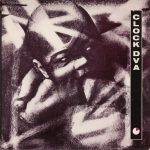Clock DVA
Clock DVA are an industrial, post-punk and EBM group from Sheffield, England. The group was formed in 1978 by Adolphus “Adi” Newton and Steven “Judd” Turner. Along with contemporaries Heaven 17, Clock DVA’s name was inspired by the Russian-influenced Nadsat of Anthony Burgess’ A Clockwork Orange; Dva is the Russian word for “two”.
Newton had previously worked with members of Cabaret Voltaire in a collective called The Studs and with Ian Craig
Marsh and Martyn Ware in a band called The Future. He formed the first lineup of Clock DVA in 1978 with Judd Turner (bass), David J. Hammond (guitar), Roger Quail (drums) and Charlie Collins (saxophone, clarinet) (born 26 September 1952, Sheffield).
Clock DVA was originally known for making a form of experimental electronic music involving treated tape loops and synthesizers such as the EMS Synthi E. Clock DVA became associated with industrial music with the 1980 release of their cassette album White Souls in Black Suits on Throbbing Gristle’s Industrial Records.
Paul Widger joined on guitar. The LP Thirst, released on Fetish Records, followed in 1981 to a favourable critical reaction, knocking Adam and the Ants’ Dirk Wears White Sox from the top of the NME Indie Charts, by which time the band had combined musique concrète techniques with standard rock instrumentation. “4 Hours”, the single from Thirst, was later covered by former Bauhaus bassist David J on his 1985 solo EP Blue Moods Turning Tail.
The band split up in 1981, with the non-original members of the band going on to form The Box.
Turner died in September 1981 due to an accidental drug overdose.

